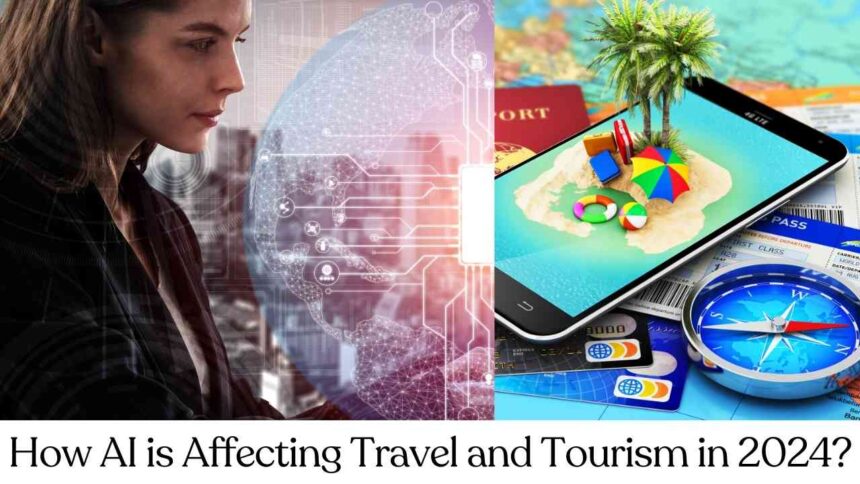Every day, advances in artificial intelligence bring new, dependable, and appealing solutions to a variety of businesses. The travel and tourism sector is still in its infancy, and AI is delivering cutting-edge solutions aimed at giving visitors unique and unforgettable experiences. Let’s discuss “How AI is Affecting Travel and Tourism in 2024?“
Long before ChatGPT’s public release in November 2022, there have been discussions regarding how AI will affect travel and tourism. However, it seemed that the futuristic idea of deploying constructive artificial intelligence within the sector suddenly evolved into a very real opportunity when OpenAI’s tool claimed to reach a million members just five days after its launch. The use of AI tools by the travel and hospitality industries could fundamentally alter both how these industries run and how customers enjoy travel. There are a plethora of consequences for the sector, such as chatbots recommending vacation plans or handling customer service duties like rescheduling flights. AI-generated texts could also be utilized for marketing or to enhance back-end processes.
AI led Growth in the Travel and Tourism Sectors
The travel and tourism sector is predicted to reach $11 billion in revenue by 2024 thanks to technology breakthroughs in artificial intelligence. The travel and tourism sector is expanding at a 38% CAGR. This expansion is also linked to the shifting tendency towards travel-related apps like those for booking hotels, restaurants, and flights. As a result, AI and other cutting-edge technologies are being included in the development processes of all app development companies, including those that produce flight booking, hotel booking, and travel portal apps.
How prepared is the travel and tourism industry for AI?
According to a 2022 survey, much fewer service professionals work in the travel and hotel sectors than in the consumer products, media, and financial services sectors. That being said, it is logical to assume that the application of artificial intelligence in travel and tourism is rapidly becoming more relevant, especially in light of the recent release of AI tools by some major participants in this industry. A global study conducted in 2022 predicted that in 2024, sales of travel businesses that are finalized as a result of AI insights will make up close to a third of their overall revenue.
How AI is indulging in the Travel Sector that is Upgrading the Travel Industry?
Traveling was difficult before the advent of AI. It was before some Booking website could suggest inexpensive flights to your desired locations, before Airbnb could offer more helpful lodging recommendations based on prior travels, and before other travelers could share travel advice on Tripadvisor.
When I was younger, finding that particular hotel required extensive time-consuming planning, including creating an itinerary, looking for flights, and navigating through numerous filters.
However, the following things have changed due to AI:
AI-enabled Chatbots
Customer service is the most crucial component of the travel and tourist industry. By being accessible to clients and answering their questions, it plays a crucial part in guaranteeing client satisfaction. Through chatbots, artificial intelligence has allowed the tourism sector to deliver top-notch customer care.
Chatbots powered by AI are used by travel companies to offer their consumers round-the-clock customer support while also lightening the load on their workforce. Additionally, chatbots satisfy clients’ need for rapid gratification by providing quick responses and information. Without human assistance, they are programmed to respond to customer inquiries and offer useful information.
Specific Recommendations
Providing a personalized travel experience is crucial for the achievement of the company in a world when everyone is glued to their smartphones. Platforms with AI capabilities are extremely useful in this situation. To promote quick and inexpensive travel planning, they provide their clients personalised travel plans and travel advice.
Machine learning algorithms are used by AI-powered systems to personalize and improve the user experience. These platforms monitor and gather information on consumer behavior, past purchases, and searches. The results of this analysis are then presented to the users in order to enhance conversions and sales.
Additionally, the AI-powered recommendation system gives the travel industry the ability to comprehend each user’s needs, interests, and budget in order to provide pertinent choices.
Robots based on AI
AI Robots are the most exciting use of artificial intelligence in the travel and tourist sector. Major chains of hotels in the hospitality sector are implementing AI robots to give their guests a unique experience. These AI robots engage with consumers face-to-face and offer them excellent customer service.
As an illustration, the Hilton Hotel in the USA unveiled Connie, a Watson-enabled robot concierge. In her interactions with visitors, Connie gives advice on where to dine, where to go sightseeing, and how to get around the hotel. For consumer engagement and interaction, Conne makes use of Watson’s topic expertise, AI, and speech recognition.
Marketing with AI
Not just the leading end of the travel sector is impacted by the robot revolution. The marketing industry is also taking notice of it. With increased accuracy, AI art software is quickly advancing its ability to produce images of high quality. Future marketing teams could employ them to create graphics for ad campaigns, it’s not impossible to think. At least for the time being, we may have to settle for using AI art as inspiration since it is debatable if employing AI trained on copyrighted works is legal.
Robots already play a significant role in the tourism business, so there is no need to be concerned about their presence there in the future. AI has actually long been a crucial component.
Analysis of data
Companies now have access to vast amounts of data thanks to AI, which collaborates with data science and machine learning. Companies can create predictive, descriptive, and prescriptive frameworks to direct their decision-making processes by using data automation tools.
Conclusion
Many people worry that in the future, artificial intelligence may entirely replace humans. The travel and tourism sector is also thought to need a human touch for experiencing tourism, which AI might not be able to achieve on its own. Instead of creating robots who are hungry for human flesh, AI is a useful component of the travel and tourism sector that helps to improve the visitor experience.
Additionally, it simplifies the process of booking travel by giving customers a customized experience. We have yet to see more sophisticated AI applications in the travel and tourism sector, which will keep improving our travel experiences. The travel business has the capacity to be completely transformed by AI.






